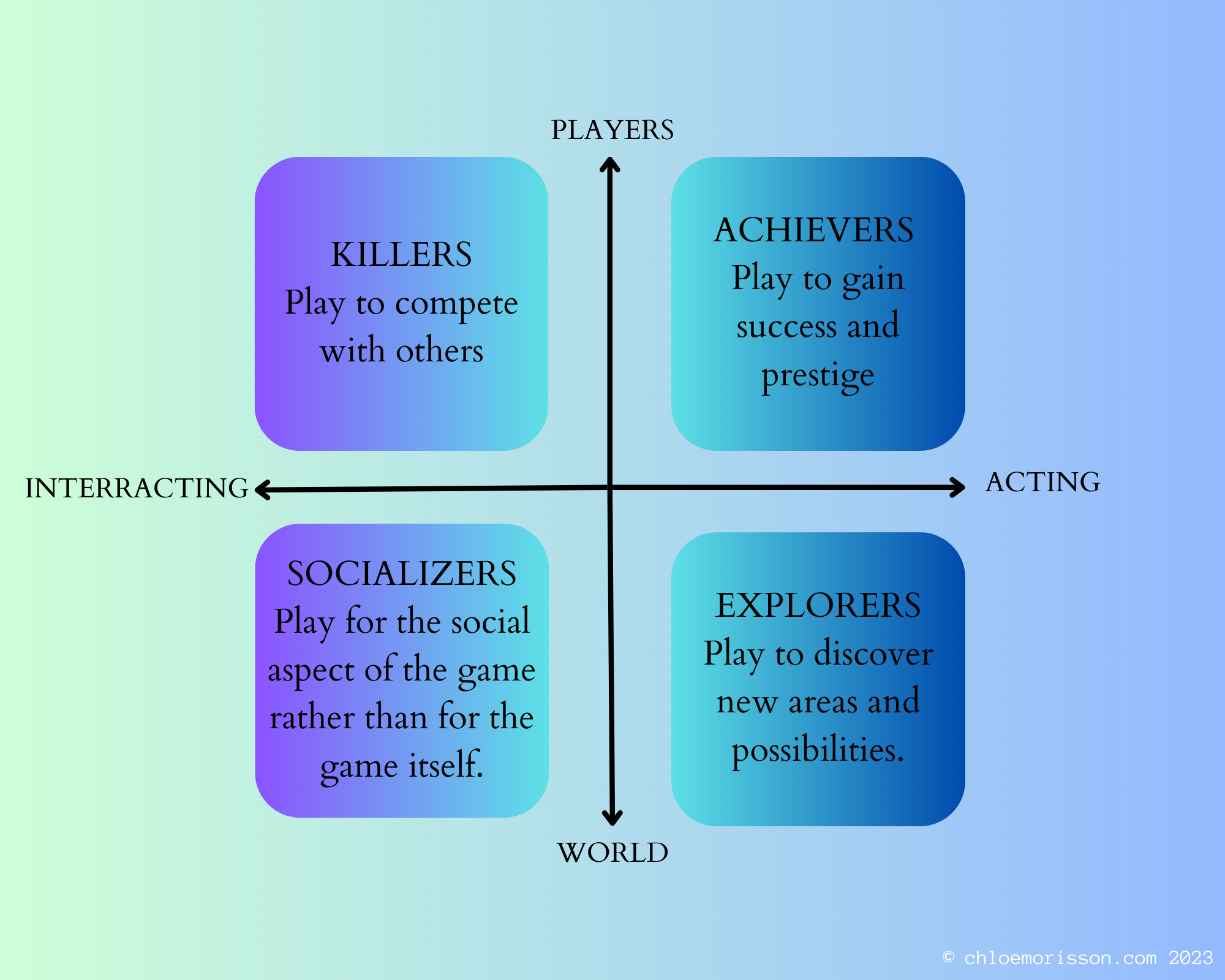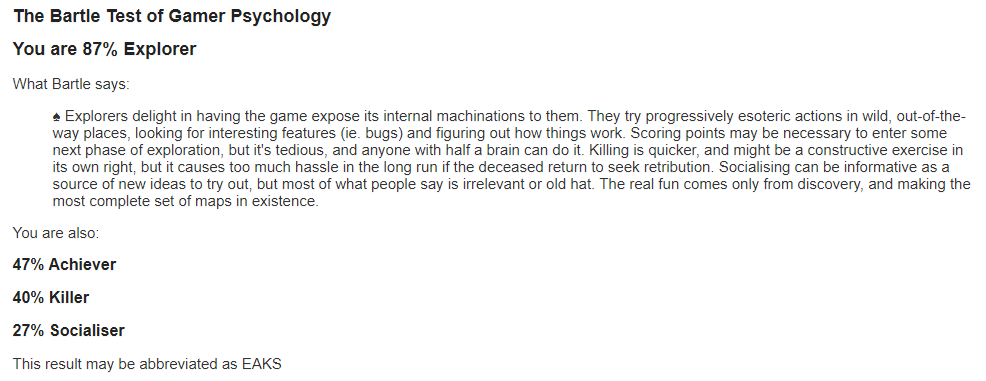How to use Bartle's Taxonomy of Gamers to motivate your team to source more.
First thing first, what is Bartle’s Taxonomy of gamers?
The Bartle taxonomy of player types is a classification of video game players (gamers) based on a 1996 paper by Richard Bartle according to specific psychological aspects of their personality and how they prefer to play in a virtual world.Richard Bartle is a British writer, professor and probably best known in the gaming community for being the co-creator of MUD1 (multi-users dungeon), but that’s pretty irrelevant for us.
When sourcing is boring
Some recruiters may find sourcing hard, tedious, boring, a total chore and something that they altogether must do, but don’t like doing.As a Recruiting or Sourcing Manager, your job is to help them find the motivation to source in order to fill their roles, and I’m going to show you how you can use Bartle’s taxonomyto help you find what motivates your team.
What is a taxonomy?
It's a a scheme of classification.This is the basics of Bartle's taxonomy: you fall into one of these categories as your main trait and you also have some of the others at a (somewhat) lower level - it's not unheard of to score at the same level for 2 traits.

Most of the time, I can be classified as a casual gamer (although. check in with me when Diablo IV has been released because I've been known to spend 2 weeks farming Diablo III just to get a gem of greed) and I've done a course on Gamification (here on Coursera, it’s really good, totally recommend it), so I find it easy enough to relate my behaviour in-game to my sourcing behaviour: I’m an explorer.
Maybe it comes from having had to source for very hard to find candidates or because I’ve worked with volume of the same role (hello evergreens, my old friends, I come to source for you again), but either way, the pool of potential candidates available is not an olympic-size pool, so that really stretched my sourcing skills and my motivation to get up in the morning to do it.
How do I know where I fall in the taxonomy?
For the purpose of this blog, I took a Matthew Baar's Bartle test and here are my results:Surprised? Just a little bit.
My results are slightly different than they were a couple of years ago. I guess working in RecOps changes your perspective somewhat. Or Covid made me less of a Socialiser and more of a Killer. But my main trait has remained consistent over the years.
I'm an Explorer at heart. Leaving no stone unturned equals sourcing for me. Achiever? Hey, I’ve got hiring targets, what do you think!
Did I think I would score higher on Killer than Socialiser, nope. That one was unexpected, but hey, every day is a learning day.
How does that help you manager your team?
When you can define what each member of your team is engaged by when it comes to sourcing, you will find their unique motivator.Once you have identified it, it will be easy for you to set goals for your recruiters to source more and better and not just because “it has to be done because no-one half-way decent applies for my jobs”.
How to classify your sourcers?
You can get them to take the Bartle test. It simple, easy and takes about 3 minutes.However, if no one in your team knows what a MMORPG (World of Warcraft type of games) is, it’s probably going to be a bit difficult for them as it’s basically behavioural questions.
No gamers in the team? No problem.
Give your team a small assignment to do during one week-end.
Download PokemonGO and play for a week-end. It’s free, it runs on almost every smartphone that’s not from the stone age, and it doesn’t require actual skills or a huge amount of time (plus you get your team to exercise!).
At the end of the week (more likely your Monday morning meeting) ask your team what they did and what they enjoyed most.
- Battling other players
- Raids
- Collecting rare Pokémons
- Unlocked badges (achievements)
- Did they start a chat with someone because they were trying to catch that Pikachu at the same street corner?
- Did they go online looking for ways to cheat the system?
- Did they cycle at less than 10Km/h to hatch the eggs quicker?
Ask them if when they source they tend to do or enjoy the same things. That should give you a fairly good idea of where they fall within Bartle’s taxonomy and what their motivators are.
Here are 2 examples of people who source, that I know.
Sourcer #1:I know their work quite well, and I would classify them this way: Achiever, Killer, Socializer, Explorer.
They're the one who break the incredibly hard to use LinkedIn free search filters because we don't have budget for a Recruiter licence. They're also quite the Socializer, engaging people with the tiniest bit of information available on their internet footprint to get them to open their email.
Sourcer #2:
I’ve only met them twice, so I don’t know their work that well, but since we met at a sourcing event, I got a fairly good overview of how they wors.
Having had so little interaction with them, I hesitate between the Socializer and the Killer as their main trait. They're the “how can I help” person who automates everything, codes in Python and can pull a list of 200 contacts in 10 minutes or less.
How do I motivate these 2 sourcers?
In a nutshell:Killers hack, cheat, heckle
Socializers share, comment, help
Achievers win, challenge, compare
Explorers investigate, create, discover
For Sourcer #1 (Achiever/Killer)
- Challenge them with a requisition that others have not been able to source for (it’s a challenge, not a punishment, don’t give them the impossible to fill role that has been open for 18 months).
- Ask them to find easier or sneakier methods to source.
- Ask them to mentor the other members of the team to show recognition of her skills.
For Sourcer #2 (Socializer/Killer)
- Send them to networking and industry events, to engage with candidates face to face and hone their skills with peers from other companies.
- Give them coding training to help them improve their automation skills, you might find yourself with a totally homemade sourcing tool before you know it!
- Recognise and reward their sourcing achievements (asking them to find email addresses for candidates because you haven't been able them yourself does not count as recognition).
Are you ready to give this a try with your team?
Ideally, we want a well-rounded team, so do you have team members with different traits each or do they tend to fall into the same category? Might be something to think of next time you’re hiring for your team!
Bonus content for those of you who will have read everything until here:



